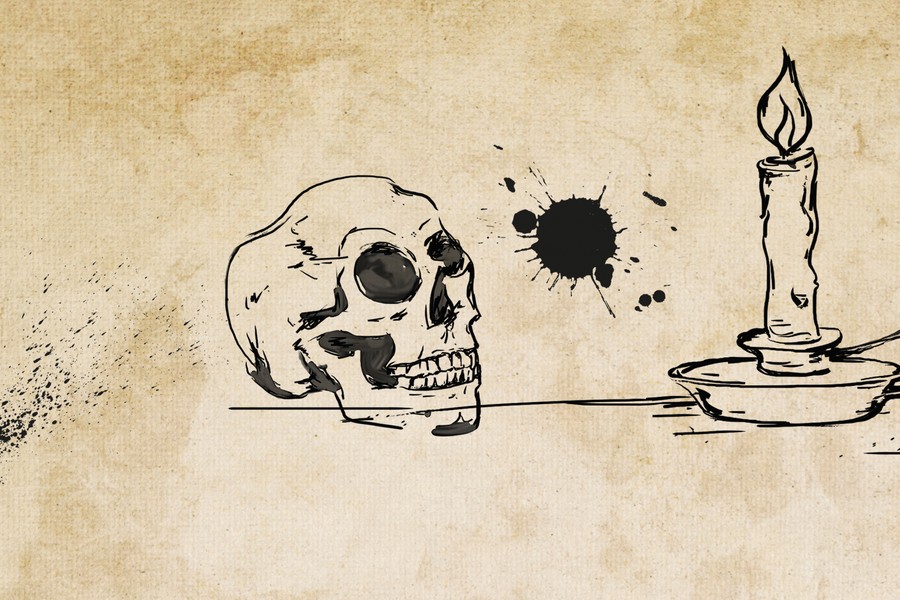Who was Shakespeare? We know little of his background and much of what we do know is a cause of debate. He was born in Stratford in 1564, and he died 23 April 1616, making this year the 400th anniversary of his death. William was the third of eight children but his schooling is a mystery with no record of his attending university. He married Anne Hathaway in 1582 but then is lost to history for several years until he pitched up in London as an established actor and playwright. Described in a pamphlet of the time as an ‘upstart crow’ by playwright Robert Greene, it seems there was much jealousy of his talent, a feeling that he should not be compared to established writers like Christopher Marlow and Greene himself.
It is thought his career started in the mid-1580s, and certainly after 1594 his plays were only performed by the Lord Chamberlain’s Men, soon to be the leading company in the capital (and after Queen Elizabeth I’s death known as The Kings Men). As a part-owner Shakespeare was a member of the consortium that in 1599 built The Globe on the south bank of the Thames. That shrewd move into part-ownership made Shakespeare a wealthy man, now able to purchase the second largest house in Stratford, New Place, dividing his time between it and London.
By the 1590s, although Shakespeare’s success meant his name was to be found on the title page, he was still acting in his and other’s work. His canon consists of 37 plays, 154 sonnets and two long narrative poems. Though some think his authorship questionable, there is no doubt that his work has been translated into every major language and performed more than any other playwright, living or dead.
Shakespeare died in Stratford, one month after signing his will which stated he was in ‘perfect health’. The reason for his demise, at 52, is not known, though there were accounts of his succumbing to a fever following a drinking session. Buried in Holy Trinity Church, Stratford-upon-Avon there are numerous memorials to his talent around the country, including Poet’s Corner in Westminster Abbey.
Ben Jonson, a Shakespeare contemporary, saw something in his work that led him to write a most prophetic statement, ‘He was not of an age, but for all time!’ His appeal endures to this day for several reasons; he wrote great stories that have transcended time and culture, which were insightful tales of the human condition that ring true even now. His subjects ranged widely and encompassed comedy, tragedy, romance, adventure, ambition and history touching on great passions, deep jealousies, ambition and questioning minds. And when we find ourselves deep within these emotions, do we not find ourselves quoting Shakespeare? We talk of “the green-eyed monster”, we state “It’s all Greek to me”, we think of foiled romances as “star crossed lovers.” Have you ever felt “The world’s mine oyster” or been “Eaten out of house and home”? These were all spoken by Shakespeare characters whose traits we can identify with today. And of course there is the language, poetic and beautiful, written in rhymes and rhythms which, when spoken properly, make perfect sense of the sentiments.
His appeal endures to this day for several reasons; he wrote great stories that have transcended time and culture, which were insightful tales of the human condition that ring true even now.
This year there will be endless opportunities to capture the essence of the man’s work in the anniversary celebrations including world tours by The Globe, a BBC drama with Dame Judi Dench and Benedict Cumberbatch, an exhibition at the British Museum and a variety of operas. Whatever your preference, it will be hard to escape the joys of Shakespeare this year.
In April The Globe is soon to complete the largest ever world tour, to 193 countries, with Hamlet finishing back where it started. The theatre is also showing all 37 of Shakespeare’s plays on film in a pop-up cinema on 23 and 24 April; each play condensed to 10 short minutes which presents an opportunity to see the complete work over 6 hours.
BBC 2 has several interesting propositions; a new sitcom from Ben Elton, ‘Upstart Crow’, about Shakespeare’s life and works, starring David Mitchell as the playwright and Harry Enfield as his father, while Benedict Cumberbatch and Judi Dench will star in the next instalment of BBC2 drama, The Hollow Crown.
The Royal Shakespeare Company will be curating a new exhibition of 100 years of Shakespeare at its Stratford home and, working in conjunction with BBC 2, will broadcast ‘Sha
kespeare Live’, an evening given over to live events, hosted by David Tennant on 23 April. Maybe the most extraordinary production of the
year will be its highly anticipated production of The Tempest, with Simon Russell Beale as Prospero. In a collaboration with Intel, it is hoping to redefine theatre using the creative process to inform the innovative uses of technology. Sounds like one to see.
Shakespeare400 is a consortium of leading cultural, creative and educational organisations, coordinated by King’s College London offering an extensive range of opportunities. Through a connected series of public performances, guided walks, live screenings, music programmes, exhibitions and creative activities in the capital and beyond, its partners will celebrate the legacy.
In Oxford the world renowned Bodleian Library will be presenting ‘Shakespeare’s Dead’ – a major Shakespeare exhibition curated by Dr Emma Smith and Professor Simon Palfrey of the University of Oxford’s English Faculty, exploring themes of death in Shakespeare’s works.
Windsor Castle, the site where Shakespeare himself read and performed to the Royal Court, will be exhibiting material in the Royal Library, including works of Shakespeare collected by the royal family, accounts of performances at Windsor Castle, and art by members of the royal family inspired by Shakespeare’s plays.
The Inigo Rooms, in Somerset House, are the place to discover the stories behind key moments in Shakespeare’s life, from the birth of the Globe Theatre in London, to his last days in Stratford. ‘By me William Shakespeare’ offers a once-in-a -generation opportunity to explore Shakespeare’s will, alongside other unique documents that witness his life. Through original research, scientific analysis and a new digital installation, the exhibition looks at why these documents were created and what they tell us about the world’s most famous playwright.
Propeller will be delivering a Pocket Tour, with support from Arts Council England, continuing with its valuable and wide reaching education programme: Pocket Dream will be touring from 1 February – 31 March 2016.
The British Library is offering ‘Shakespeare in Ten Acts’ showcasing over 200 unique and rare items such as the only surviving play-script in Shakespeare’s hand, an authentic Shakespeare signature, the earliest printed edition of Hamlet from 1603 and Shakespeare’s First Folio.
If music is more your forte then a trip to Glynebourne will reap rewards for its revival of Sir Peter Hall’s ‘A Midsummer Night’s Dream’ by Britten.
The Royal Opera House has Christopher Wheeldon’s three-act ballet adaptation of Shakespeare’s ‘The Winter’s Tale’, a story of love, loss and reconciliation with music by Joby Talbot.
One of the more unusual touring productions this year comes from Spymonkey, ‘The Complete Deaths’, a show which draws together all 74 onstage deaths for a strange and bloody Shakespeare-inspired evening.


